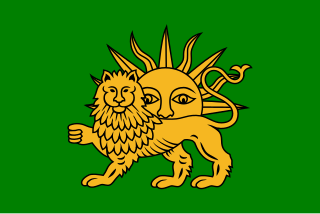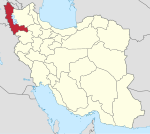
The Baháʼí Faith is a monotheistic religion founded in the 19th century that teaches the essential worth of all religions and the unity of all people. Established by Baháʼu'lláh, it initially developed in Iran and parts of the Middle East, where it has faced ongoing persecution since its inception. The religion has 5-8 million adherents spread throughout most of the world's countries and territories.

Persian, also known by its endonym Farsi, is a Western Iranian language belonging to the Iranian branch of the Indo-Iranian subdivision of the Indo-European languages. Persian is a pluricentric language predominantly spoken and used officially within Iran, Afghanistan, and Tajikistan in three mutually intelligible standard varieties, respectively Iranian Persian, Dari Persian, and Tajiki Persian. It is also spoken natively in the Tajik variety by a significant population within Uzbekistan, as well as within other regions with a Persianate history in the cultural sphere of Greater Iran. It is written officially within Iran and Afghanistan in the Persian alphabet, a derivative of the Arabic script, and within Tajikistan in the Tajik alphabet, a derivative of the Cyrillic script.

Iran, officially the Islamic Republic of Iran (IRI) and also known as Persia, is a country in West Asia. It borders Turkey to the northwest and Iraq to the west, Azerbaijan, Armenia, the Caspian Sea, and Turkmenistan to the north, Afghanistan to the east, Pakistan to the southeast, the Gulf of Oman and the Persian Gulf to the south. With a multi-ethnic population of about 86 million in an area of 1,648,195 km2 (636,372 sq mi), Iran ranks 17th globally in both geographic size and population. It is the sixth-largest country entirely in Asia and one of the world's most mountainous countries. Officially an Islamic republic, Iran has a Muslim-majority population. The country is divided into five regions with 31 provinces. Tehran is the nation's capital, largest city and financial centre.

The Iran–Contra affair, also referred to as the Iran–Contra scandal, the Iran Initiative, or simply Iran–Contra, was a political scandal in the United States that centered around arms trafficking facilitated by senior officials of the Ronald Reagan administration to Iran between 1981 to 1986. As Iran was subject to an arms embargo at the time of the scandal, the sale of arms was deemed illegal. The administration hoped to use the proceeds of the arms sale to fund the Contras, an anti-Sandinista rebel group in Nicaragua. Under the Boland Amendment, further funding of the Contras by legislative appropriations was prohibited by Congress, but the Reagan administration figured out a loophole by secretively using non-appropriated funds instead.

The Iran–Iraq War, also known as the First Gulf War, was an armed conflict between Iran and Iraq that lasted from September 1980 to August 1988. Active hostilities began with the Iraqi invasion of Iran and lasted for nearly eight years, until the acceptance of United Nations Security Council Resolution 598 by both sides. Iraq's primary rationale for the attack against Iran cited the need to prevent Ruhollah Khomeini—who had spearheaded the Iranian revolution in 1979—from exporting the new Iranian ideology to Iraq. There were also fears among the Iraqi leadership of Saddam Hussein that Iran, a theocratic state with a population predominantly composed of Shia Muslims, would exploit sectarian tensions in Iraq by rallying Iraq's Shia majority against the Baʽathist government, which was officially secular but dominated by Sunni Muslims. Iraq also wished to replace Iran as the power player in the Persian Gulf, which was not seen as an achievable objective prior to the Islamic Revolution because of Pahlavi Iran's economic and military superiority as well as its close relationships with the United States and Israel.

Kurds or Kurdish people are an Iranic ethnic group native to the mountainous region of Kurdistan in West Asia, which spans southeastern Turkey, northwestern Iran, northern Iraq, and northern Syria. There are exclaves of Kurds in Central Anatolia, Khorasan, and the Caucasus, as well as significant Kurdish diaspora communities in the cities of western Turkey and Western Europe. The Kurdish population is estimated to be between 30 and 45 million.
The Persians are a Western Iranian ethnic group who comprise the majority of the population of Iran. They share a common cultural system and are native speakers of the Persian language as well as of the languages that are closely related to Persian.

Ruhollah Musavi Khomeini was an Iranian Islamic revolutionary, politician and religious leader who served as the first supreme leader of Iran from 1979 until his death in 1989. He was the founder of the Islamic Republic of Iran and the main leader of the Iranian revolution, which overthrew Mohammad Reza Pahlavi and ended the Iranian monarchy. Ideologically a Shia Islamist, Khomeini's religious and political ideas are known as Khomeinism.

Zoroastrianism, also called Mazdayasnā or Beh-dīn (بهدین), is an Iranian religion centred on the Avesta and the teachings of Zarathushtra Spitama, who is more commonly referred to by the name Zoroaster. Among the world's oldest organized faiths, its adherents exalt an uncreated, benevolent, and all-wise deity known as Ahura Mazda, who is hailed as the supreme being of the universe. Opposed to Ahura Mazda is Angra Mainyu (𐬀𐬢𐬭𐬀⸱𐬨𐬀𐬌𐬥𐬌𐬌𐬎), who is personified as a destructive spirit and the adversary of all things that are good. As such, the Zoroastrian religion combines a dualistic cosmology of good and evil with an eschatological outlook predicting the ultimate triumph of Ahura Mazda over evil. Opinions vary among scholars as to whether Zoroastrianism is monotheistic, polytheistic, henotheistic, or a combination of all three. Zoroastrianism shaped Iranian culture and history, while scholars differ on whether it significantly influenced ancient Western philosophy and the Abrahamic religions, or gradually reconciled with other religions and traditions, such as Christianity and Islam.

Tehran is the capital and largest city of Iran. In addition to serving as the capital of Tehran province, the city is the administrative center for Tehran County and its Central District. With a population of around 9.8 million in the city as of 2025, and 16.8 million in the metropolitan area, Tehran is the most populous city in Iran and Western Asia, the second-largest metropolitan area in the Middle East after Cairo, and the 24th most populous metropolitan area in the world. Greater Tehran includes several municipalities, including, Karaj, Eslamshahr, Shahriar, Qods, Malard, Golestan, Pakdasht, Qarchak, Nasimshahr, Parand, Pardis, Andisheh and Fardis.

The history of Iran is intertwined with Greater Iran, a sociocultural region spanning from Anatolia to the Indus River and from the Caucasus to the Persian Gulf. Central to this area is modern-day Iran, which covers the bulk of the Iranian plateau.

The Iran hostage crisis was a terrorist action taken by Iran involving an attack on the American embassy in Tehran. Fifty-three United States diplomats and citizens were held hostage in Iran from November 4, 1979 to their release on January 20, 1981. They were taken as hostages by a group of armed Iranian college students who supported the Iranian Revolution, including Hossein Dehghan, Mohammad Ali Jafari and Mohammad Bagheri. The students took over the U.S. Embassy in Tehran. The crisis is considered a pivotal episode in the history of Iran–United States relations.

The Iran national football team, recognised as IR Iran by FIFA, represents Iran in men's international senior football and is governed by the Football Federation Islamic Republic of Iran (IRI).

The Iranian revolution, also known as the 1979 revolution, or the Islamic revolution of 1979 was a series of events that culminated in the overthrow of the Pahlavi dynasty in 1979. The revolution led to the replacement of the Imperial State of Iran by the present-day Islamic Republic of Iran, as the monarchical government of Mohammad Reza Pahlavi was superseded by the theocratic Ayatollah Ruhollah Khomeini, a religious cleric who had headed one of the rebel factions. The ousting of Pahlavi, the last Shah of Iran, formally marked the end of Iran's historical monarchy.

Ali Hosseini Khamenei is an Iranian cleric and politician who has served as the second supreme leader of Iran since 1989. He previously served as the third president of Iran from 1981 to 1989. Khamenei's 35-year-long rule has made him the longest-serving head of state in the Middle East, as well as the second-longest-serving Iranian leader of the last century after Shah Mohammad Reza Pahlavi. Khamenei is a Grand Ayatollah and marja, and is considered the leader of Shia Muslims and the Axis of Resistance.

Iran is subdivided into thirty-one provinces, each governed from a local centre, usually the largest local city, which is called the capital of that province. The provincial authority is headed by a governor-general, who is appointed by the Minister of the Interior subject to approval of the cabinet.

The Islamic Revolutionary Guard Corps, also known as the Iranian Revolutionary Guards, is a multi-service primary branch of the Iranian Armed Forces. It was officially established by Ruhollah Khomeini as a military branch in May 1979 in the aftermath of the Iranian Revolution. Whereas the Iranian Army protects the country's sovereignty in a traditional capacity, the IRGC's constitutional mandate is to ensure the integrity of the Islamic Republic. Most interpretations of this mandate assert that it entrusts the IRGC with preventing foreign interference in Iran, thwarting coups by the traditional military, and crushing "deviant movements" that harm the ideological legacy of the Islamic Revolution. Currently, the IRGC is designated as a terrorist organization by Bahrain, Canada, Saudi Arabia, Sweden and the United States.
The Iranian peoples, or the Iranic peoples, are the collective ethno-linguistic groups who are identified chiefly by their native usage of any of the Iranian languages, which are a branch of the Indo-Iranian languages within the Indo-European language family.

Mohammad Reza Pahlavi, commonly referred to in the Western world as Mohammad Reza Shah, or simply the Shah, was the last monarch of Iran (Persia). In 1941 he succeeded his father Reza Shah and ruled the Imperial State of Iran until 1979 when the Iranian Revolution overthrew him, abolished the monarchy and established the Islamic Republic of Iran. In 1967, he took the title Shahanshah, and also held several others, including Aryamehr and Bozorg Arteshtaran. He was the second and last ruling monarch of the Pahlavi dynasty. His vision of the "Great Civilization" led to his leadership over rapid industrial and military modernization, as well as economic and social reforms in Iran.

The Guarded Domains of Iran, commonly called Safavid Iran, Safavid Persia or the Safavid Empire, was one of the largest and longest-lasting Iranian empires. It was ruled from 1501 to 1736 by the Safavid dynasty. It is often considered the beginning of modern Iranian history, as well as one of the gunpowder empires. The Safavid Shāh Ismā'īl I established the Twelver denomination of Shīʿa Islam as the official religion of the empire, marking one of the most important turning points in the history of Islam.




















